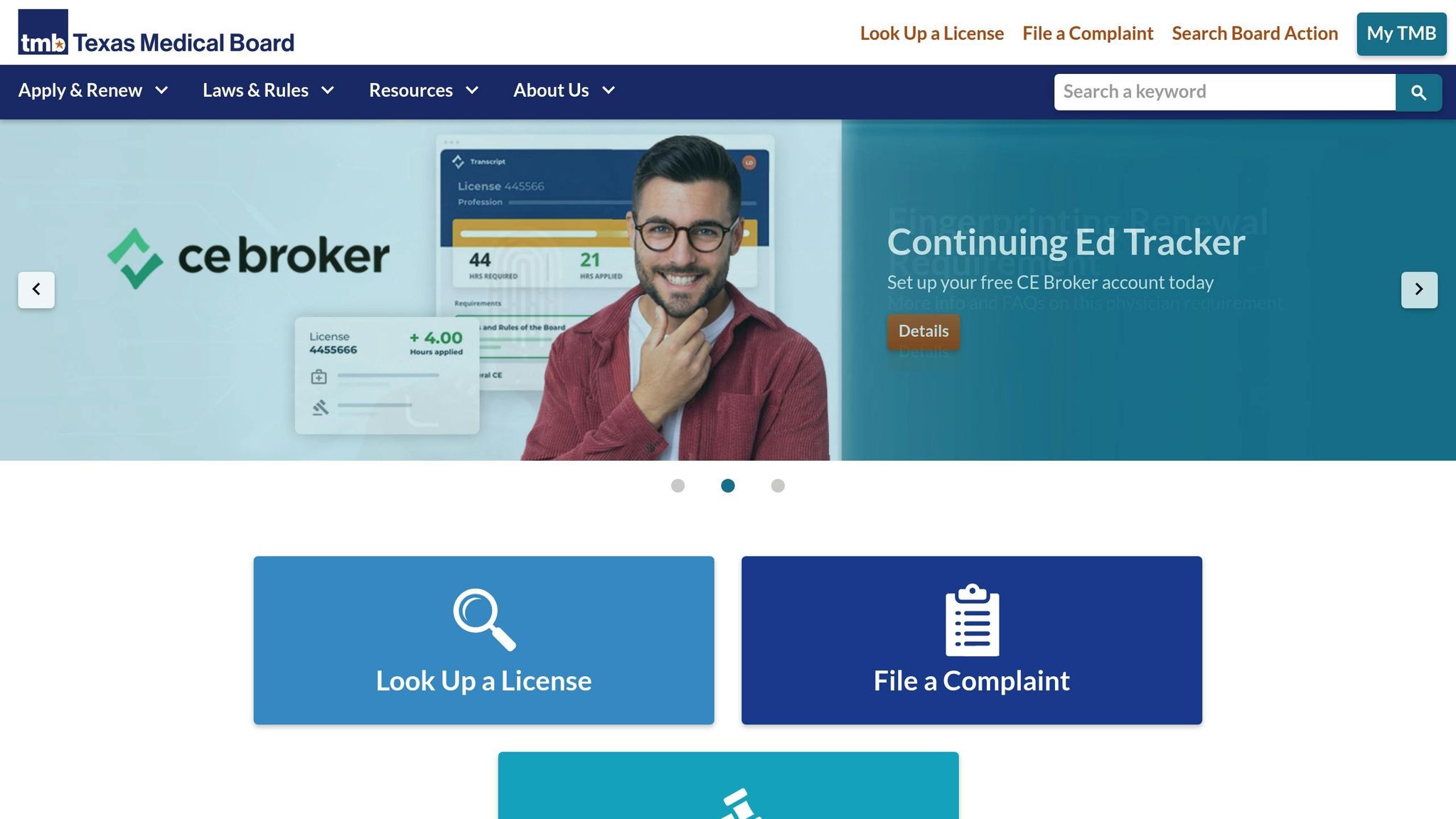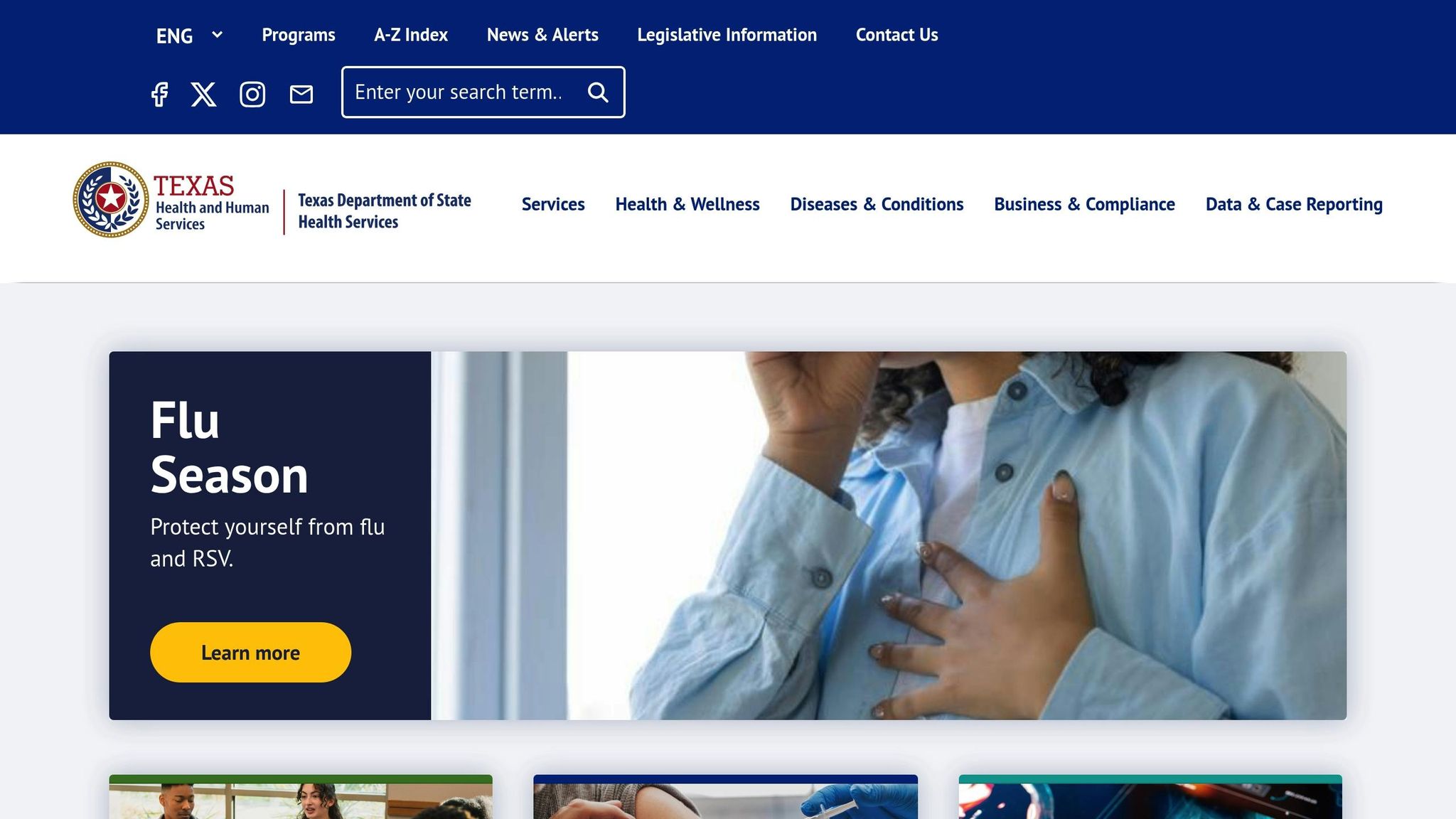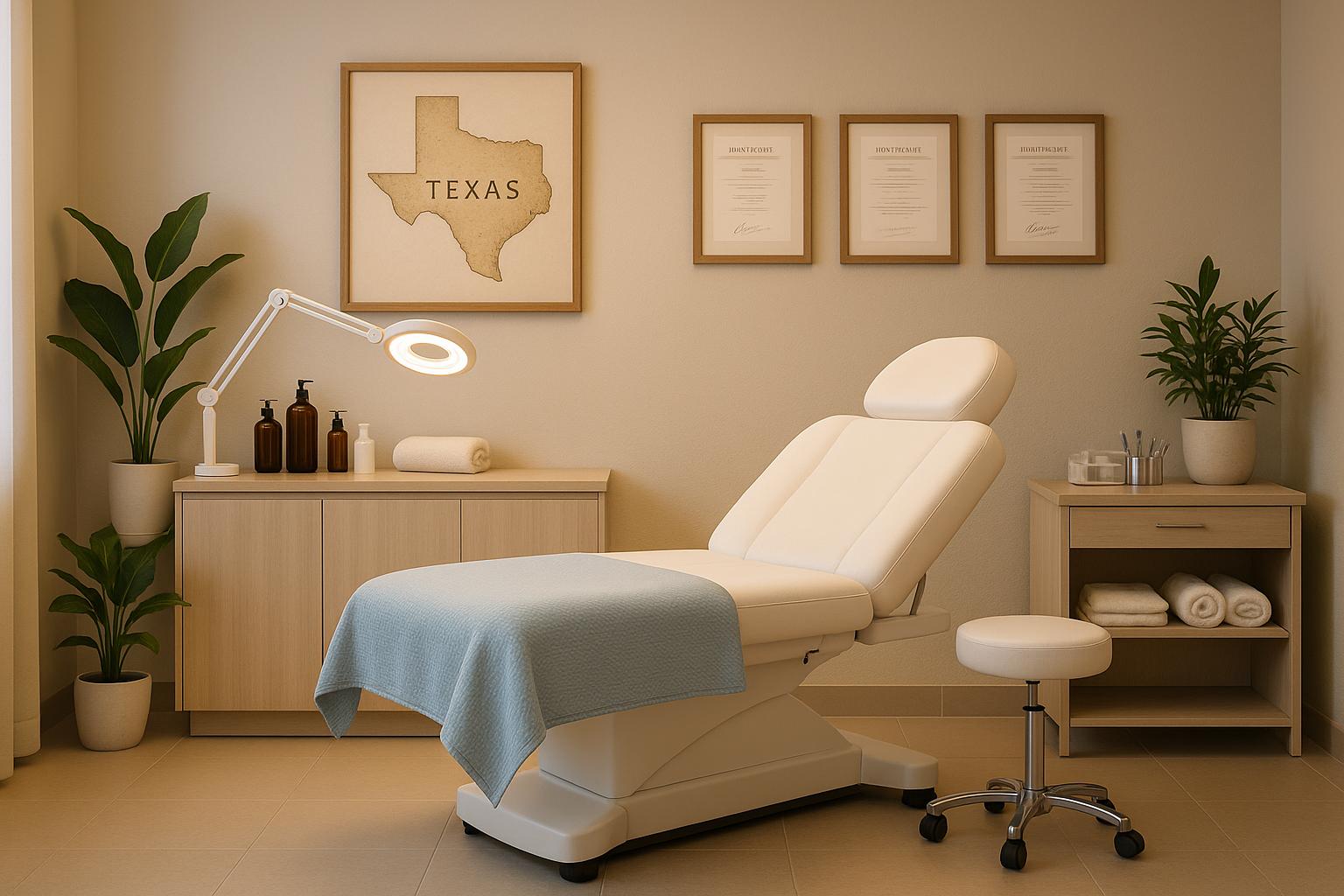Starting a med spa in Texas? Here's what you need to know about licensing and compliance:
- Med Spa Services Are Medical Practices: Texas law classifies med spa services as medical practices, requiring compliance with state and federal regulations.
- Severe Penalties for Non-Compliance: Fines, license revocations, and even jail time can result from ignoring rules.
- Corporate Practice of Medicine Doctrine: Only licensed physicians can make medical decisions, impacting med spa ownership and operations.
- Three Regulatory Agencies: The Texas Medical Board (TMB), Texas Department of Licensing and Regulation (TDLR), and Texas Department of State Health Services (DSHS) oversee med spas.
- Practitioner Licensing: Medical directors must be licensed physicians, and all staff need proper certifications for their roles.
- Facility Standards: Facilities must meet health, safety, and specific service licensing requirements, including permits for treatments like laser hair removal or tanning.
- HIPAA Compliance: Protect patient data with secure storage, encryption, and clear consent protocols.
Texas med spa regulations are strict, but understanding these rules ensures compliance, protects your business, and prioritizes patient safety.
Texas Med Spa Regulatory Bodies
Understanding the roles of regulatory agencies is crucial for med spa operators, especially given the penalties for non-compliance discussed earlier. Here's a closer look at the key agencies involved in overseeing med spa operations in Texas and their specific responsibilities.
Texas Medical Board (TMB)

The Texas Medical Board (TMB) plays a central role in regulating the medical aspects of med spa operations. Since Texas considers most med spa services as part of medical practice, the TMB oversees physician licensing, medical director requirements, and supervision protocols. A licensed physician must act as the medical director and manage delegation procedures. Additionally, the TMB sets rules for informed consent, medical record-keeping, and emergency procedures. The board is also responsible for investigating complaints and enforcing disciplinary actions when necessary.
Texas Department of Licensing and Regulation (TDLR)

The Texas Department of Licensing and Regulation (TDLR) focuses on non-medical services and certain treatments commonly offered at med spas. For example, TDLR regulates laser hair removal by establishing training requirements, equipment standards, and facility guidelines. The agency also oversees licensing for estheticians, who perform complementary non-medical services. Understanding where medical services end and non-medical services begin is essential to ensure compliance with TDLR regulations.
Texas Department of State Health Services (DSHS)

The Texas Department of State Health Services (DSHS) oversees specific treatments offered at med spas, such as tanning services and permanent makeup procedures. While not all med spas provide these services, those that do must comply with DSHS regulations. The extent of DSHS oversight varies depending on the treatment. For example, although laser hair removal typically falls under TDLR regulation, certain scenarios might also require DSHS licensing. These overlapping responsibilities mean operators must carefully verify requirements for each service. DSHS also helps establish health and safety standards for facilities, though details about enforcement and inspections can sometimes be unclear. Staying informed about their protocols is essential.
To maintain compliance, med spa operators should coordinate with each agency and stay current on licensing, renewal, and enforcement requirements. A clear understanding of these regulatory bodies is key to managing practitioner licensing and ensuring facility standards are met.
Med Spa Practitioner Licensing and Credentialing
Getting practitioner licensing right is one of the most important steps to running a compliant med spa in Texas. It’s not just about having licensed professionals - it’s about making sure each practitioner meets specific requirements tied to their role. This ensures your med spa operates within the law while providing safe, effective treatments.
Medical Directors and Physicians
Every med spa in Texas must have a licensed physician as the medical director. This physician takes full responsibility for all treatments and procedures performed at the facility. To meet state requirements, the medical director must hold an active, unrestricted license from the Texas Medical Board. Importantly, this oversight role cannot be delegated to anyone else.
The medical director’s duties go far beyond supervision. They’re responsible for creating written protocols for every medical procedure offered, developing emergency response plans, and ensuring all staff members fully understand their scope of practice. They must also be reachable during operating hours, whether by phone or electronic communication.
While general practitioners can act as medical directors, med spas offering specialized treatments - like laser procedures or injectables - often benefit from having directors with specific training in areas like dermatology, plastic surgery, or aesthetic medicine. Additionally, medical directors must stay current by maintaining continuing medical education (CME) credits, which cover the latest practices in aesthetic medicine, safety standards, and regulatory updates.
Understanding the roles and limitations of non-physician practitioners is another critical piece of the compliance puzzle.
Non-Physician Practitioners
Texas med spas rely on various licensed professionals, each with clearly defined scopes of practice. For example:
- Registered Nurses (RNs) can administer Botox, fillers, and operate lasers, but only under a physician’s delegation and strict protocols.
- Nurse Practitioners (NPs) and Physician Assistants (PAs) can evaluate patients and perform more complex procedures with less direct supervision but still under the medical director’s guidance.
- Licensed Estheticians handle non-medical treatments like facials, chemical peels (depending on strength), and certain laser hair removal services, regulated by the Texas Department of Licensing and Regulation (TDLR).
- Massage Therapists can provide therapeutic massages but are not allowed to perform medical treatments or use medical devices unless they receive additional training and proper delegation.
Each practitioner must complete specialized training for their respective procedures and maintain current licenses. For example, estheticians must pass state exams after completing approved training programs, and massage therapists need active licenses issued by the TDLR.
Supervision and Delegation Protocols
Texas law requires written delegation agreements between the medical director and non-physician practitioners performing medical procedures. These agreements outline the specific procedures each practitioner is authorized to perform, the conditions under which they can perform them, and the level of supervision required - whether direct (on-site) or indirect (remote availability).
For treatments like Botox or laser procedures, practitioners often need procedure-specific training certificates. These certifications, often provided through manufacturer-sponsored training, must be documented and kept in personnel files.
Emergency protocols should also be well-documented, and all staff must be trained to handle adverse reactions and know how to contact the medical director immediately. The medical director is responsible for reviewing and approving all treatment protocols, consent forms, and safety procedures. They also conduct regular quality assurance reviews to address compliance issues.
Preventing "scope creep" - where practitioners perform unauthorized procedures - is essential. Regular training and clear documentation help staff stay within their allowed roles, ensuring safe and lawful operations.
With practitioner roles and supervision in place, the next step is ensuring the facility itself meets all licensing and operational requirements.
Facility Licensing and Compliance Requirements
In Texas, med spa facilities are required to obtain the proper permits, pass inspections, and follow strict health and safety protocols. Meeting these requirements is critical to avoid delays and keep your facility compliant. The process begins with understanding the standards and then securing the necessary licenses.
How to Obtain a Facility License
The licensing process in Texas involves working with different agencies, depending on the services your med spa provides. For medical procedures, you’ll need to contact the Texas Department of State Health Services (DSHS). If your facility offers non-medical services like esthetics or massage therapy, the Texas Department of Licensing and Regulation (TDLR) will handle your licensing needs.
When applying for a facility license, you’ll need to submit detailed floor plans. These should show that your facility has proper ventilation, lighting, and sufficient space to meet compliance standards.
Permits for Specific Services
The types of services your med spa offers will determine whether additional permits are required. Specialized services, such as laser treatments, tanning, or chemical procedures, often come with their own certification and training requirements. It’s essential to check with the appropriate agency - like DSHS or TDLR - to confirm what permits are needed for each service. These permits are part of the broader health and safety compliance framework.
Health, Safety, and Sanitation Standards
Med spas in Texas must meet extensive health and safety standards, many of which align with OSHA regulations. Infection control measures are a cornerstone of compliance. To maintain a safe environment:
- Clean all treatment surfaces with EPA-approved disinfectants after each appointment.
- Sterilize reusable medical instruments following established healthcare protocols.
- Dispose of needles, gloves, and other infectious materials in designated sharps containers and biohazard waste bins.
Beyond routine cleaning, implement daily deep-cleaning procedures for treatment rooms and communal areas using hospital-grade disinfectants. Linens and other reusable items should either be disposable or thoroughly sterilized between clients.
Proper air filtration and ventilation systems are also vital. Regular maintenance of these systems helps reduce airborne contaminants and ensures a safer facility.
Employee safety is equally important. Staff must have access to personal protective equipment (PPE) such as gloves, masks, and eye protection. Regular training on handling hazardous materials and chemical agents is also essential.
For facilities employing licensed cosmetologists or estheticians, additional rules apply under Chapter 1603 of the Texas Occupations Code and Title 16, Texas Administrative Code, Chapter 83. These requirements include proper sterilization of equipment, safe storage of chemicals, and maintaining detailed service records.
To stay compliant, document everything - cleaning procedures, equipment maintenance, staff training, and any safety incidents. Regular internal audits can help you identify and fix potential issues before state inspections. A well-maintained, compliant facility not only meets state requirements but also demonstrates your dedication to patient safety.
Next, we’ll look at legal and recordkeeping standards to round out your compliance strategy.
sbb-itb-02f5876
Compliance and Legal Considerations
Running a med spa in Texas comes with a heavy responsibility to follow legal, privacy, and recordkeeping standards. These rules are in place not only to protect your business but also to safeguard your professional license. As highlighted earlier in discussions on practitioner licensing and facility standards, staying compliant with the law is non-negotiable.
HIPAA and Patient Data Management
Med spas handle sensitive patient data, which means they must comply with the Health Insurance Portability and Accountability Act (HIPAA). Protecting this information starts with setting up clear and secure data management protocols. Every staff member who has access to patient information should undergo HIPAA training. This training should cover how to manage medical records, appointment details, treatment logs, and payment data responsibly.
For digital records, encryption is a must - both for stored data and during transmission. Role-based access controls should limit employees to only the information necessary for their specific tasks. Physical records need to be kept in locked storage, and computer systems should automatically lock when left idle.
Consent forms are another key element. These forms should clearly outline how patient information will be used, including treatment details, billing, and any related communications. Patients also have the right to request copies of their records or correct errors in them.
HIPAA violations can lead to hefty fines and other penalties. Beyond securing data, thorough documentation is essential to staying compliant over the long term.
Recordkeeping and Reporting Requirements
Texas med spas are required to keep detailed records covering treatments, staff qualifications, and facility operations. Treatment records should include the date of service, procedures performed, products used, the staff member responsible, and any adverse reactions. These records must be retained according to state guidelines, with additional rules for minors.
Staff documentation is equally important. This includes maintaining up-to-date licenses, training records, and continuing education certificates. Medical directors must also document their supervisory activities and any corrective actions they take.
For equipment like lasers and IPL machines, facilities need to log maintenance and calibration dates, along with any safety incidents. If adverse events occur, they must be reported promptly, with detailed descriptions of what happened, how it was addressed, and steps taken to prevent recurrence.
Financial records are another critical area. Med spas must keep accurate records of insurance billing, patient payments, and refunds to stay compliant with tax laws and prepare for regulatory audits.
Penalties for Non-Compliance
Failing to comply with legal and regulatory standards can have serious consequences. Penalties range from fines to license suspension or even revocation, which can bring operations to a halt until issues are resolved.
Regulatory authorities can impose steep fines or take legal action against facilities that fail to meet the required standards. Common violations include operating without proper oversight or neglecting recordkeeping obligations. In extreme cases - especially those involving patient harm - criminal charges may follow, leading to legal and financial repercussions, as well as potential convictions.
Non-compliance doesn’t just affect the facility; it can also jeopardize the professional licenses of individual practitioners. To avoid these risks, regular compliance audits and consultations with legal experts are essential. Identifying and addressing issues early is far more cost-effective than dealing with penalties after the fact.
Managing Compliance with Prospyr

Running a med spa in Texas requires meticulous attention to compliance, from securing patient data to maintaining clear documentation and efficient workflows. Prospyr's platform is designed to meet these regulatory demands head-on. Below, we'll explore how Prospyr supports HIPAA compliance, streamlines operations, and enhances patient engagement.
Prospyr's HIPAA-Compliant Features
Prospyr is built with HIPAA standards at its core, ensuring patient data is protected through advanced encryption and strict access controls. Its integrated CRM/EMR system securely stores patient information, giving med spas a reliable way to manage sensitive records.
Digital intake forms simplify onboarding by collecting critical details like medical history, consent forms, and treatment preferences. These records are stored securely, reducing the risk of errors or data breaches.
Prospyr also offers AI-driven note creation and transcription tools, which automatically generate detailed treatment records. These notes capture everything from procedures performed to products used and any adverse reactions, making it easier to maintain thorough documentation and stay audit-ready.
To further safeguard data, the platform uses role-based access controls. This ensures that staff members only access the information necessary for their specific roles, aligning with HIPAA's "minimum necessary" standard.
Streamlining Workflows for Better Efficiency
Managing a med spa involves a constant balancing act of administrative tasks, from tracking staff certifications to ensuring equipment is properly maintained. Prospyr simplifies this with its task manager, which automates reminders for license renewals, CME requirements, and equipment calibration schedules.
The platform’s smart scheduling system does more than just book appointments. It matches procedures to practitioners based on their credentials, ensuring only qualified staff handle treatments requiring medical oversight. This not only improves compliance but also prevents scheduling errors.
Prospyr also integrates payment processing, supporting both virtual and in-person transactions. Every transaction generates detailed logs, which are invaluable for audits and resolving billing inquiries.
Real-time analytics provide med spa owners with a clear picture of operational performance, offering insights into staff productivity, treatment outcomes, and compliance metrics. These tools help identify potential issues early, allowing owners to address them before they become larger problems. By automating these workflows, Prospyr makes daily operations more efficient while laying the groundwork for a smoother patient experience.
Enhancing the Patient Experience
Compliance doesn’t have to come at the cost of patient satisfaction. Prospyr’s AI-powered booking tools make scheduling easy while ensuring that eligibility and consent requirements are met before finalizing appointments.
Secure email and SMS communication tools keep patients informed and engaged. Automated appointment reminders, follow-ups, and educational messages not only reduce no-shows but also improve treatment outcomes. The platform’s review management features further help med spas monitor and respond to patient feedback, boosting their online reputation.
Prospyr also supports subscription-based treatment plans through its membership management tools. These features track benefits, treatment schedules, and payment histories, creating a seamless experience for patients while keeping med spas compliant with regulations.
Additionally, Prospyr’s marketing automation tools attract new patients by capturing leads and managing outreach, all while adhering to privacy and communication standards. This combination of tools ensures med spas can grow their business without compromising on compliance or patient trust.
Key Takeaways for Texas Med Spa Owners
Running a med spa in Texas involves navigating a maze of regulations. To ensure smooth operations, you must comply with guidelines set by the Texas Medical Board, the Texas Department of Licensing and Regulation, and the Texas Department of State Health Services.
Licensing and credentialing are essential. Your medical director must hold an active physician license, and all non-physician practitioners need valid certifications. Clear supervision and delegation protocols are not just legal requirements - they’re critical to protecting both your practice and your patients.
Facility licensing isn’t just about securing basic permits. Each service you offer may require specific authorizations. Regular inspections and adherence to health, safety, and documentation standards are key to staying compliant with state regulations.
HIPAA compliance is non-negotiable. A data breach could lead to malpractice claims and serious damage to your reputation. To avoid this, use HIPAA-compliant platforms to secure patient data and minimize risks.
Implementing robust systems can simplify compliance. Tools like Prospyr can automate regulatory tasks, protect patient information, and keep your documentation organized. These systems not only reduce the risk of malpractice claims but also save time and effort.
Technology can also give you a competitive edge. Automating tasks like license renewals, maintaining audit-ready records, and managing staff credentials allows you to focus on delivering excellent patient care. This approach strengthens your practice while ensuring compliance.
FAQs
What does a medical director do in a Texas med spa?
A medical director at a Texas med spa is a licensed physician who oversees clinical operations while ensuring everything aligns with state regulations. Their primary focus is on patient safety, which involves supervising procedures, delegating medical tasks to qualified team members, and creating treatment protocols.
Beyond these responsibilities, medical directors are also in charge of staff training and ongoing monitoring to guarantee treatments are performed safely and meet high-quality standards. They ensure that every service provided adheres to Texas law and take ultimate responsibility for the medical care delivered at the practice.
What steps should a Texas med spa take to ensure compliance with HIPAA regulations when managing patient data?
To meet HIPAA requirements, med spas in Texas need to focus on data security by putting strong measures in place to protect patient information. This means using HIPAA-compliant software to manage protected health information (PHI), ensuring all staff are trained in privacy protocols, and performing regular audits to spot and fix any potential weaknesses.
It’s equally important to stay informed about both state and federal regulations and to create clear policies for managing sensitive data. These steps help med spas protect patient privacy while staying within the boundaries of the law.
What happens if a med spa in Texas doesn’t meet state licensing and operational requirements?
Failing to meet Texas med spa licensing and operational requirements can result in severe repercussions. These include hefty fines, suspension or loss of licenses, and even criminal charges - with practicing medicine without a license being classified as a felony in Texas.
Moreover, running a med spa without adequate medical supervision or hiring unlicensed staff can open the door to civil lawsuits for negligence or malpractice. Staying compliant with state laws is essential to protect your business from legal troubles, financial penalties, and damage to your reputation.



